Indice - Table of contents
Lo Nuevo[hide]
Reportes: From The St... : Cubadisco 2...
Fotos: Tom Ehrlich
Staff: Kristina Lim
Musicos: Juan Formell
Musicos: Yordamis Megret Planes
Musicos: Yasser Morejón Pino
Musicos: José Luis "Changuito" Quintana...
Musicos: Dennis Nicles Cobas
Fotos: Eli Silva
Grupos: Ritmo Oriental : 1988 - Vol. IX - 30 a...
Musicos: Rafael Paseiro Monzón
Musicos: Jiovanni Cofiño Sánchez
Fotos: Tom Ehrlich : 2024 Monterey Jazz, P...
Resenas: Vacilón Santiaguero (Circle 9 ...
Fotos Del Día [hide]
Reviews - Peliroja
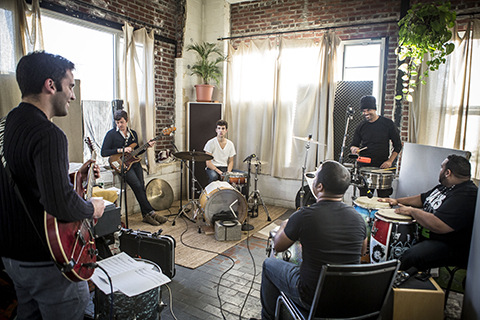
New York City has always been known as a cultural melting pot in which many of the world’s folkways meet and mix into unusual and exciting hybrids, creating new styles and trends in a dynamic way that few cities have been able to match. This may be one of the reasons Gotham has been such a hub for Cuban music, which by nature has the same tendency to absorb and assimilate different influences as it continues to evolve. This fact is indeed very present today, as a small yet innovative enclave of musicians have been taking the sounds of Cuba both new and old to create a sound that is undeniably New York in nature.
One such project is Peliroja, an Afro-Latin/Afro-beat mélange that has been turning heads and defying classification since the release of its eponymous debut in 2014. The project is the brainchild of instrumentalists Jacob Plasse and Michael Eckroth in conjunction with vocalist/percussionist Jainardo Batista. The album is a kaleidoscopic assortment of juxtaposed styles, layered on top of one another in a manner that is simultaneously intriguing, startling and at times tongue-in-cheek. The recording is a crossroads in which musicians from many of the city’s different niches where chosen to contribute, creating a distinctive vibe unlike anything else out there.
Eckroth and Plasse met while performing in the Celia Cruz Story, a biographical off-Broadway musical based on the life of the iconic Cuban singer. “We both had similar interests in older Cuban music and we naturally fell into working on some projects together”, says Eckroth. Although Jacob had been actively performing with his own group Los Hacheros, he was beginning to get more serious about writing and producing. Plasse came to Eckroth with the idea of co-writing some original salsa music. Their initial efforts would later become the Melaza project, a forceful “tip of the hat” to the fertile heyday of Mongo Santamaria, Ray Barretto and Hector Lavoe. Like Peliroja, Melaza’s album can also be found on Plasse’s own Chulo Records on both CD and vinyl. Eckroth explains further, “Our co-writing process had really been successful. But it was clear with the inception of the Chulo Records label that the music was going to have to become more "crossover" to non-Latino audiences and take advantage of all of our varied influences”.

In terms of varied influences, both Eckroth and Plasse had indeed many in which to draw from. Jacob Plasse, a Manhattan-born guitarist, tresero, bandleader, producer and studio composer, has also become known for his unique ability to create distinct bands and recording projects that sound like nothing else in the idiom. In his early career he had spent a lot of time playing in Bachata and Son bands and even went to Cuba to study tres. However, he was also being influenced by some of the Indie performers he was working with, and by underground Brazilian disco and afrobeat recordings, as well as strange varieties of Afro-Cuban and Afro-latin music from the 60s and 70s along with varying boogaloo styles. Furthermore, he has also developed a penchant for analog and vintage sounds, as well as old school recording techniques such as recording bands live to tape. These factors, along with other singular attributes, have become signature characteristics of the “Chulo Records sound”.
On the other side of the spectrum, keyboardist Mike Eckroth was coming from an extensive background as both a jazz performer and as a salsa musician on the west coast and in New York, performing with everyone from John Scofield’s New Quartet to Ralph Irizarry’s Son Café. In addition, he had also studied in Cuba during the 90s where he was exposed to ample amounts timba cubana as well as all the historical Cuban music styles in which he had long been interested. He adds, “I had also gone to Brazil on a yearly basis since the 90s, so there was some of that in there too. There were so many influences out there to use so it was clear that what was coming next was going to be something more original and expressive. We decided to go for a weird, eclectic approach to writing and deliberately mixed styles, hoping to go for authentic mash-ups rather than contrived superimposition, which is often what happens when you fuse styles together”.
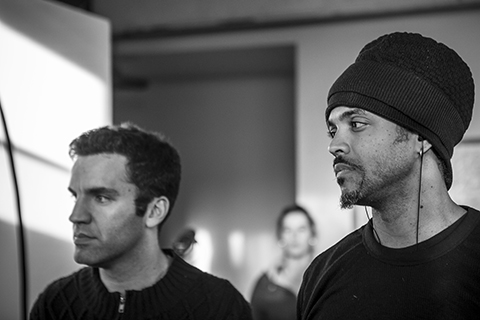
Although the writing partnership between Plasse and Eckroth had proven to be highly successful, both acknowledge that the addition of Jainardo Batista as the third co-writer really made the sound of Peliroja come to life. Mike Eckroth explains, “Keeping the lyrics in Spanish was one of the controlling factors of the project. His [Batista’s] background in Afro-Latin music keeps the singing of the band in Afro-Cuban territory, which of course is related to all the other styles we were dealing with, so it all kind of works together anyways. More importantly, his lyrical content for this project was way more edgy than any Latin popular music I've heard recently, which I think results from the counter-culture aesthetic we were trying to curate”.
Co-founder, lead singer and conga player of Nu D’Lux (formerly Nu Guajiro), Jainardo Batista has been a long-standing pillar of the NYC Cuban music scene. Moving to New York from Puerto Rico in 1993, he arrived at a time when the city was just beginning to see an influx of musicians coming in from Cuba during the Special Period, as a result bringing with them more up-to-date versions of Son, Changüi and the modern sounds of Cuba as well. Jainardo’s interest in deepening his experience in Cuban music has lead him to a career that has primarily focused on this genre, however not excluding other traditions and musical styles in the process. Batista explains the writing process in his own words, “Basically, I would ask Jacob to provide the theme or topic of the song and from there I would work on the lyrics. For example, the song Injusticia is based on the Trevon Martin case back in 2012, and can also be related to other cases of a similar nature that happened before and after”.
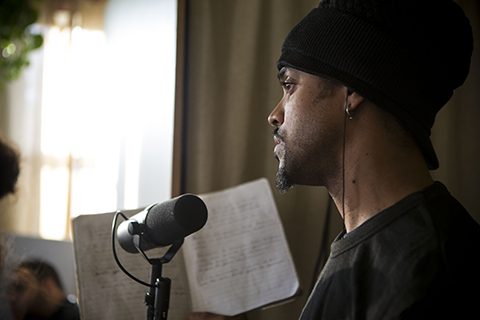
Mike Eckroth continues, “We had some clear stylistic templates that evolved during our writing sessions. One big challenge was that we were searching for a way to do the boogaloo style without sounding as corny as many of the Latin versions that had been done in the past (and their more recent imitators). The tune Ingrata Conclusion, which incorporates a folkloric bomba percussion squad, is a result of that.” Both Eckroth and Plasse cite Mongo Santamaria's Afro Roots album as a key influence as well. “For some of the up-tempo tunes, we started with grooves derived from Afro Roots and superimposed some afro-beat comping patterns. Of course the final playing doesn't sound anything like the Mongo stuff but that's just how the process worked.”
Eckroth also explains how the distinctive tracks Situaciones and Honor Enjendrado, resulted from similar amalgamative processes. “Situaciones revolves around a groove taken from some regional afro-beat music (with a 6/8 pulse added beneath) and a slower merengue groove, which are totally different beats but somehow work great in tandem. Honor Enjendrado started as a 4/4 guitar riff Jacob was doing, but I felt it starting one beat in front or behind, and added the whole 6/8 matrix on top, creating a refreshing texture. All the arrangements on the album are mine, and I did my best to maximize the different sounds we were generating”.
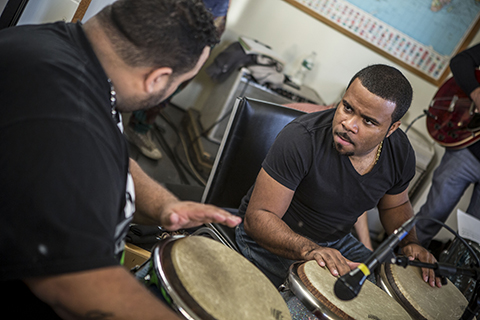
Of course, one cannot ignore the undeniable influences of both Pre and Post-Revolutionary Cuba on the sound of Peliroja. Tunes such as La Fobia (the Cuban Mozambique rhythm), Bohemio (an Arsenio-y Son Montuno), Ciudad De Nadie (a 1970s-sounding songó groove), and Se Equivocó (kind of a bolero-son) were, according to Eckroth, composed with specific Afro-Cuban popular rhythmic styles and time periods in mind. He adds, “Of course the Cuban rhythms were changed a lot by the drum set patterns, which are more American or Afro-beat sounding. This is an important point of distinction for the group, as are the horn arrangements I did in most cases to sound deliberately non-salsa”.
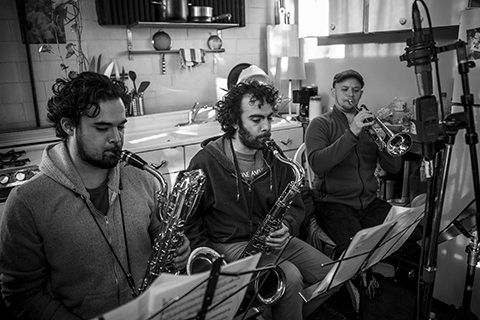
While the pallets of the composers and lyricist were indeed quite broad, the synthesis of styles was not limited to the writing process. The recording methods, as well as the lineup of the band itself, had just as much to do with the final product. Mike Eckroth explains, “For the session, the personnel was mainly up to Jacob, and after we decided on the instrumentation (female coro, trumpet-tenor-bari horn section, to use drumset, electric bass, electric guitar, electric keyboards) he put the group together from a mixture of Daptone players, Latin/salsa players from New York, and guys who had done the afro-beat scene”.
For bass and drums, Plasse turned to none other than his high-school comrades Nick Movshon and Homer Steinweiss, both known for their work with the Daptones and Amy Winehouse, among others in the New York City Soul and Afro-beat community. Plasse adds, “What I thought was so interesting was that we were taking them out of there comfort zone by making them do more Latin-oriented music with bad-ass players such as Carlitos Padron (La India) and Jhair Sala (Pedrito Martinez Group) and Carlos Maldonado (Arturo O'Farrill). I didn't want anyone to play outside of their style, I just wanted to see what would happen if the soul guys played like the soul guys and the Latin guys played like the Latin guys and how that would work instead of a “fusion album”. I didn't want it to be a “fusion album” because that word in general makes me a little nauseous. I just wanted people to be themselves and create a middle ground in which to communicate musically. Ultimately, I think we achieved that, especially because the arrangements sort of had that concept in mind to begin with”.
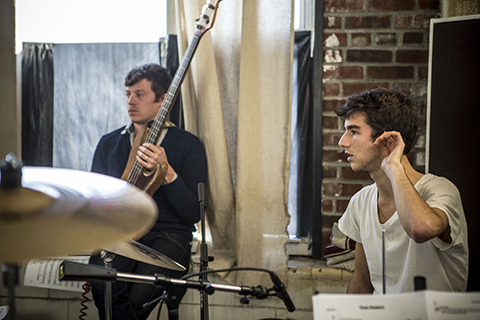
Eckroth elaborates further, “Although we had written from some rhythmic templates and with the idea of using breakbeats or funky drums on top of percussion grooves, a lot of the actual execution of the style was figured out in rehearsal or in the first takes. We recorded to a Tascam 8-channel tape recorder for those initial sessions with some vocal overdubs, keeping the gritty one-room sound. The thing that makes the tracks interesting is the varied playing styles of the musicians. Not everyone was hip to every little influence in there, and at some points we just threw them to the wolves, but the results were organic and personal”.
The Peliroja album is available for purchase in both CD and Vinyl form on the Chulo Records website. Inquisitive audiences can also catch the band live at various venues around the NYC area. The next Peliroja performance will take place at Subrosa on May 27th alongside L.A. based “psychedelic ranchero” group Chicano Batman. Tickets can be purchased on Subrosa’s website and all other information on Peliroja can be found via Facebook and their own website as well.

















